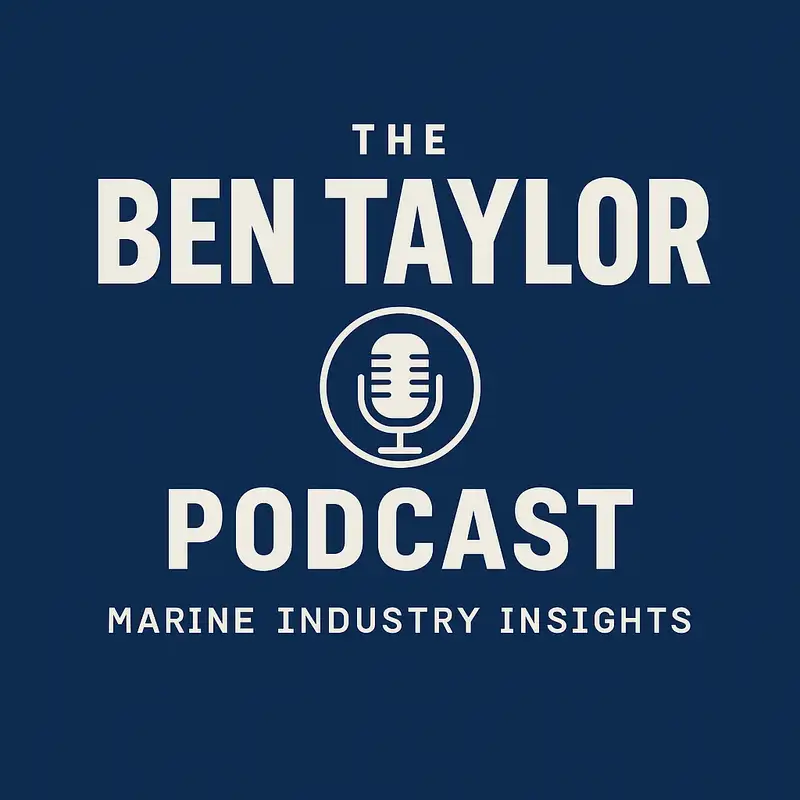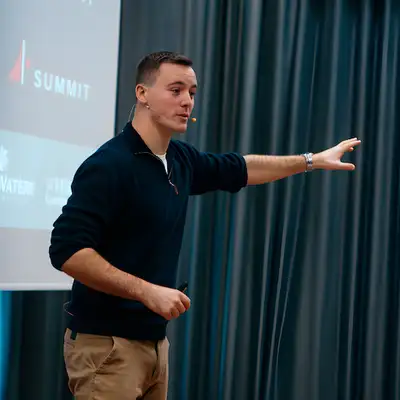
Australia's Unique Yachting Challenges
They usually end up with us because we have the most comprehensive insurance product in the market. And so we are able to protect the asset they have worked so hard for. This is the Ben Taylor Podcast, the home of Marine Industry Insights. Enjoy. Hi everybody. Welcome to another episode of the Ben Taylor Podcast, the home of Marine Industry Insights. We're doing a little series to profile the Australian industry and see what's going on across yachting in this particular region. And I'm here with Michaela from Pantanius. Nice to see you, Michaela. Hello, Ben. So tell me, let's have some context first. A little bit about Pantanius and how you kind of go around your approach to this market. That would be really interesting. Look, Pantanius, 126 years, family history, family-owned business based in Hamburg. This specific genre of the business is basically done or founded by Howard Farman in the 60s, early 60s. So we only do petrocharged insurance in the yacht department of Pantanius. We have multiple subsidiaries across Europe and we have one subsidiary in the Southern Hemisphere. That's the office here in Australia. That's you guys. Okay. Yes, and that's us. So we are around since the end of 2011 and that's a few years now. This conference where we're here today at the ASMEX, the Australian Superyacht and Marine Export Conference, is around since 2012 and we have been a supporter of this conference since then, since day one. Yeah. And it's why we do this, it's like why we started it. It was actually our managing director, Martin Baum, the founder's son. He said, look, I really would like to start in this area. So he really put us into it together with the founder of this conference, Marion Edwards. And since then, we're supporting this event and it has been really, really good for us. It's just like a massive networking event. It's a huge learning curve. We were able to actually show a lot of transparency to the industry, what Pantanius does, what we cover. Like we could explain our network, our connections. We're dealing with probably 30,000 marine industry partners, our claims handling, our cover that we offer and so forth. We have a huge wealth of knowledge group-wide, of vessel knowledge. We're insuring over 100,000 vessels worldwide. We are the most experienced pleasure craft insurer in the world, hands down. Could you explain that? I suppose the strategy of supporting an event like this in terms of kind of, okay, wonderful sponsor it and get the brand out there and meet all the people around the place. But why is that such an effective approach for you guys in particular? It is so easy. It's very easy because this is an opportunity, a platform, which we support, where we can talk to marina owners, marina operators and the marine industry. And we actually connect with them, personally connect with them. We explain the brand and the product to them. And then they recommend us. Because it's a, do you know anyone who can insure my vessel? Yeah, we go to Pontanus. Yeah, so it's getting that relationship in the first place ready for that conversation. And you have to go in business to make it, which has always been the case. If it's 100 years ago or 50 years ago or last week, you have to go the extra mile. You need to do grassroots. You need to start slow and build up the momentum and build a brand. And could you give us a little insight from an insurance perspective of the type of things you're seeing in the Australian market? Maybe some challenges, some new things, just to learn a little bit about the place. We do, we are here in the southern hemisphere, and so we have to deal with a lot of, you know, named tropical storms between November and May. So it's a difficult, difficult time and really hard for insurers to obtain cover. So the insurers, the underwriters, they're very strict with what can be covered. We still, we are still able to offer cover for vessels based in the northern part of Australia, so above 26 and a half degrees. And we are able to offer cover if the vessels are permanently located in this area. But then it also comes with some restrictions. It has to be in a secure marina berth, or the vessel has to, either you're during the storm and the storm has been announced, named tropical storm, the vessels can also move into the mangroves, which is kind of safe, or they're strapped down on the hard stands, yeah, or you're at sea. So there's a couple of restrictions. No swing moorings, right, during a storm, for instance, yeah. So that's one of the challenges being in Australia. Other challenges we face is the vessels in Australia in the water 24-7. You know, there's no winter storage. Here in Europe, where I'm coming from originally, in Germany, we take the water, the boats out of the water, yeah. They're in winter storage, some on land. They're in here and they're exposed to the weather conditions 24-7. Therefore, some vessels, of course, age quicker. And for us, it's for us as an insurer, it is important that we constantly check the seaworthiness of the vessels and make sure the vessels are properly maintained. And if we do this well, we will keep our claims ratio on a level where we do not have to increase our premiums. And that's what we want, yeah. We want to make sure that the claims are all paid for because that's what you have insurance for, you know, the peace of mind, but also make sure that the vessels we insure are not SBs, which we call them. Yeah, it's a really interesting play because you want a level of fairness. Totally. To your customers, but then there's also a bigger picture there of let's manage this in a sensible way to make sure reasonable precautions are being made. 100%. So that ridiculous situations don't occur and avoidable situations don't occur. So the whole market is actually more healthy. Absolutely. And we are really good at it because we have this wealth of experience. Yeah, you've got the history. We know, we have the history. You know, we sit on a lot of data and we know how we assess a risk. We know what we need to restrict, you know, to expose ourselves less and also make it easier for our customers. You know, we tell them this is an area where you shouldn't go. And if you go into this area, then you should do this, this, this. Yes, it's a series of advice. It's guidance. Like we're not just here for when bad things happen. It's like a bit of help constantly. Yeah, and we want, we have this, you know, around the world was spontaneous. We encourage our customers to take their vessels into the blue water. I know we are the world's biggest blue water insurer. You know, there's thousands of boats in the oceans and we want them to be there. Yeah, but we also want them to have the precaution to be knowledgeable. So we share a lot of our knowledge, a lot of prevention articles we share with our customers. We have a lot of EDMs to our customers to stay in touch with them. And we're very transparent about it. And we share our knowledge, which is so important. Okay, and then let's wrap up on a bit of a vision looking forward. I'm after learning quite a lot over the past week or so. I'm actually quite optimistic about the health of this market and what it will become. What's your kind of feeling about what might happen? The smaller market is, we listened to the economist of the Bank of Queensland this morning. He's always spot on, like absolutely spot on. I think we're in a much better space than we are all thinking. The bigger boat market from 1 million onwards, it's actually quite okay. The market hasn't been affected too much. And we do okay because people work hard to be able to purchase a boat. And then they look around the market and how can they protect the asset. And they usually end up with us because we have the most comprehensive insurance product, and so we are able to protect the asset they have worked so hard for. But I think the market is in a good space. Australia is doing really well. So that's all I can say. Okay, brilliant. Thank you so much for your insights, Michaela. Thank you. Everybody, if you enjoy content like this and find it insightful, make sure you'll follow in here to see plenty more of it. All being well, we'll see you again soon. Bye for now. Thank you for listening to another episode of the Ben Taylor podcast, the home of marine industry insights. We'll see you again very soon. Bye for now.
Creators and Guests
